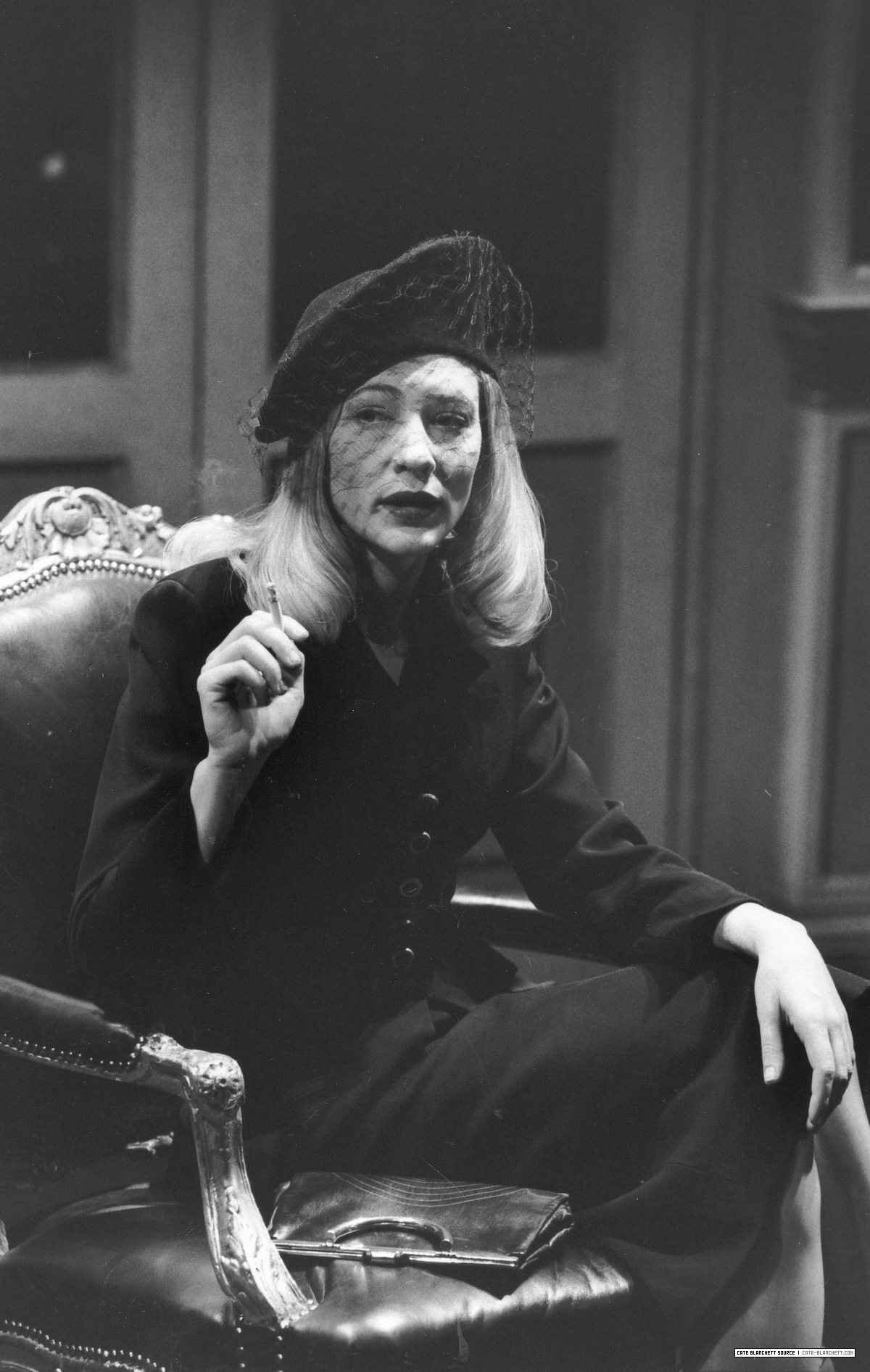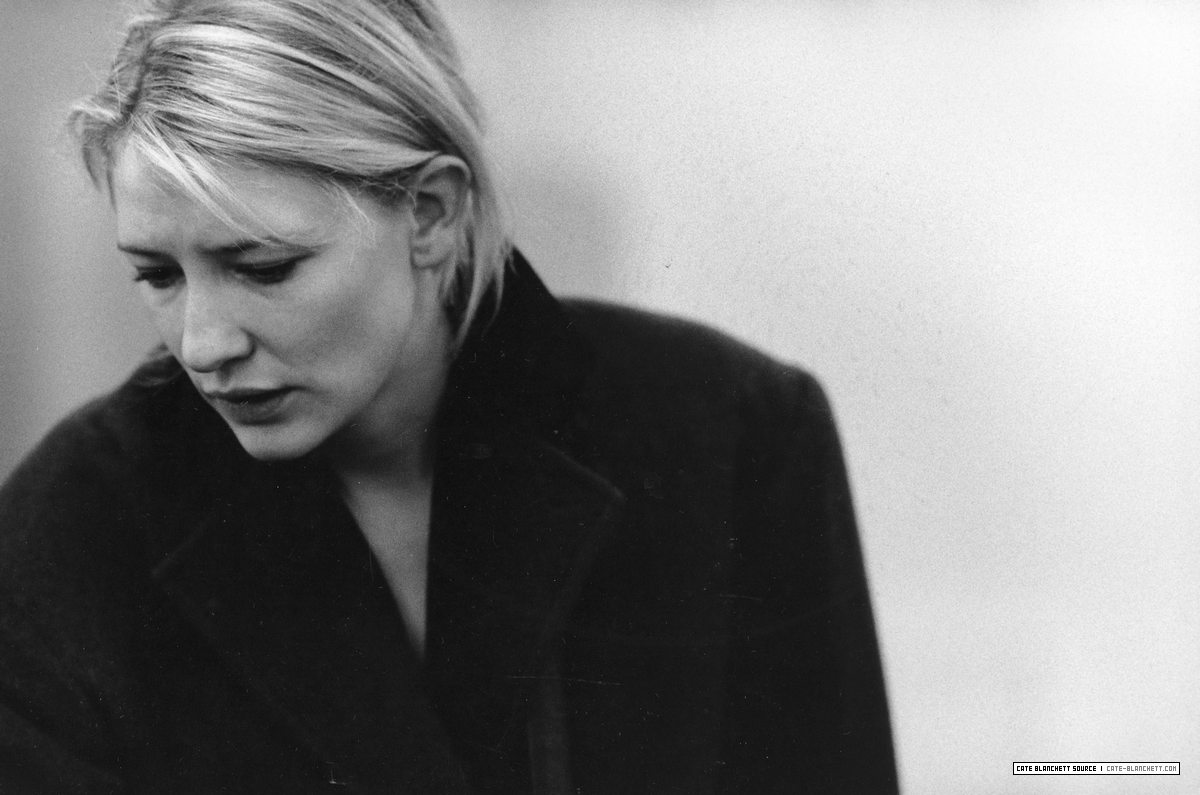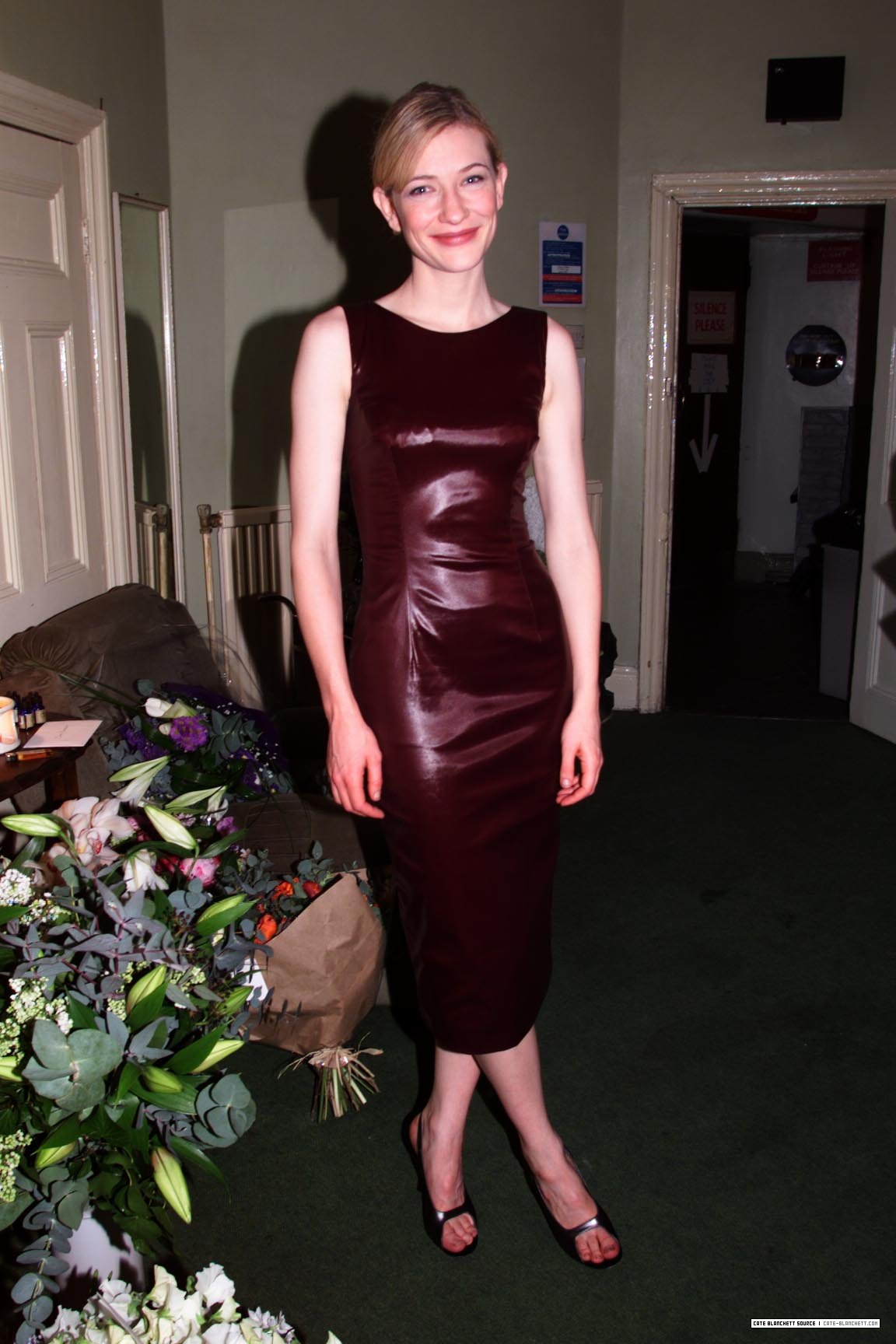
Cate Blanchett as: Susan Traherne
Directed by: Jonathan Kent (for Almeida Theatre)
Play by: David Hare
Play run: 15 April – 10 July 1999 (opened on 27 April 1999)
Venue: Albery Theatre
Post war history is seen through the life and loves of a former French Resistance fighter; Susan Traherne, now disaffected and cynical, marries a conventional career diplomat and proceeds to wreck both their lives.
Cast:
Cate Blanchett as Susan Traherne
Julian Wadham as Raymond Brock
Debra Gillet as Alice Park
Duncan Bell as Codename Lazar
Katie Blake as Dorcas Frey
Alain Bourgouin as Frenchman
Jacqui Chan as Mme. Aung
Jeremy Child as Sir Andrew Charleson
Jamie de Courcey as John Begley
Heather Dickinson as Louise
Richard Johnson as Sir Leonard Darwin
Burt Kwouk as M. Aung
Alec Newman as Mick
Georges Trillat as Frenchman
Creatives:
Set design by Maria Björnson
Lighting design by Mark Henderson
Sound design by John A Leonard
Related Images
View more images at the gallery.


- On her favourite piece of direction she received from David Hare: “He said, ‘You know she’s England; she is what is happening to Britain’. I thought well, I can’t act that, but that is brilliant. What that does is make your brain go a bit sideways. You are involved in the meta-meaning of the work, which means your performance connects to bigger things.” (Sydney Morning Herald, November 2015)
- “It’s very rare that you encounter plays written in your lifetime that are as extraordinary and far-reaching as this. What makes the play great, like Hedda Gabler is great or Hamlet is great, is that there is no judgment on the character. David throws these complete, well-rounded and flawed people together in the room, and just lets them thrash out the enormous questions. It’s rare that you read that. And what’s so interesting about Susan is that she pits herself against her environment differently in every scene, so she’s almost a different creature in every scene … But what I love about Plenty is that it’s a proper piece of work that feels as if it’s been gathered together in a really healthy way. It’s not a vehicle.” (Telegraph Magazine, March 1999)
- “Obviously I am not doing it for pure altruistic reasons, but I do think this is an incredible piec of writing. It’s interesting that it hasn’t been done since 1978 and I think David wants to see what it means today and I do too. He’s really curious to know what this play means to an audience who have no memory of the Suez crisis. Of course, I have no memory of it.” (TimeOut London, April 1999)
- On the play’s mixed reviews: “In reviewing Plenty no one has made any mention of Sweet Phoebe at all or mentioned that it was received incredibly well. That was only three years ago and the production was reviewed by all the main papers but suddenly I’m now a film actor and I am perceived incredibly, and therefore judged incredibly, differently. It’s affected the whole fabric of the way people are coming to watch this play. That’s not something that I’ve spent any time dwelling on but it’s just been thrown back in my face a little bit, and while I don’t want to wear a T-shirt saying that ‘I trained at Drama School and worked primarily in the theatre, I’ve made five films but I’ve been in double the number of plays’, I have become pigeon-holed, and with high-profile actors in film there’s sometimes a sense that you move into theatres for credibility or something.
I’m not up there to be liked but the reason why I don’t find reviews particularly helpful is because if they are fantastic then you puff up like a peacock, which is not helpful, and if they are terrible and destructive then you still have to go out and do it, and yet it’s just someone’s opinion. The greatest strength that you have to have, and that’s why it’s so important who you’re surrounded by, is the people you are working with.
Overall being a little adrift and coming here and working in the theatre were useful. The more baggage you accumulate as an actor, and the more public you become, the harder it is to shed that off. I was grateful for not doing Plenty in Australia in some ways because the challenge for me was greater because I was less known and I didn’t know the other actors and so could take risks.” (Playing Australia, 2003)
Quotes from Others
- Jonathan Kent:
— At the time that Cate Blanchett performed in Plenty, Susan Traherne has not been played by a British actor: “As an Australian, Cate brings that quality of the outsider which is very useful to the role. She has a fierceness of intelligence, a determination and a strength which is quite remarkable.”
— On Cate Blanchett being the right person for the role: “Susan is a woman who finds herself unable to be accomodated by the society in which she lives. Any more that you would consider doing ‘Hamlet’. The only way David would let me do ‘Plenty’ was if there was a figure to carry the play. It’s a contemporary tragedy and there are very few of those. It is the most demanding part for a woman that I can imagine. Cate brings to it a biting intelligence and a determination as an actress along with a willingness to take risks.” - David Hare:
— “After all her stage work in Australia and just a few films, she is already one of the most socially resonant actors we have.”
Selected Reviews
Excerpts from selected reviews.
- The Standard — “Plenty is David Hare’s passionate lament for Britain and what we chose to become, after being shored up on the shaky banks of peace when the Second World War was over. At its 1978 National Theatre premiere the play stirred brisk measures of delight, laced with a few, well-turned jibes. But last night Plenty had the look and sound of a robust period-piece in which Hare puts the old country through a full medical examination and finds her chronically unwell. His play was given an injection of pure excitement by the casting of the Australian film-star Cate Blanchett in the role of a very English heroine, a rebel always on the verge of breakdown.
As with her Elizabeth on film Miss Blanchett’s voice sounds the essence of England, all Australian sounds exorcised. Stylishly done up, though hardly ever undone, in period clothes, sex-appeal clings to her brisk, cool performance with almost indecent enthusiasm. But the fascination of Plenty goes well beyond the London stage debut of this fresh film star. Hare sits in scathing, satirical judgment on the state of Britain in two decades after 1945.
The play’s episodic quality makes for a faltering, jerky dramatic action, despite Hare’s scathing, incisive eloquence and his skill in capturing the lingo of the diplomatic world. But there’s a tremendous key scene which draws the play’s emotional and thematic strands together. Richard Johnson’s impressive, sherry-dry, ram-rod straight ambassador Sir Leonard, goaded by Susan, speaks out undiplomatically against Britain’s hypocrisies in Suez. Miss Blanchett’s Susan, who has both tried her hand at conventional life in advertising and forays into bohemia, then turns upon Leonard whom she wrongly identifies as the epitome of bad, old England.
Her emotionally disturbed outburst and collapse do not ring true. The performance becomes raucously overpitched whenever high emotion is demanded. But she cuts an elegant, sexy line in bohemian unconventionality. And the final, elegiac flashback to Susan in France at war’s end, predicting her future happiness, is deluged with pathos.” - Variety — “The performance won’t be to everyone’s taste — its intensity is deeply un-English, which, of course, is part of the point — any more than Hare’s jagged, fractured narrative spanning almost 19 years will please those merely content to celebrity-spot. But as abetted by a terrific supporting cast who cumulatively match Blanchett’s Susan blow for blow, this year’s Oscar-nominated lead in “Elizabeth” delivers the goods in conjunction with a play whose Ibsenesque fury rings out no less resoundingly than it did in 1982 on Broadway, under the author’s direction of a then little-known Canadian firebomb named Kate Nelligan.
It’s tempting to regard “Plenty” as a one-woman show, since Susan is hardly ever offstage. So it’s Kent’s very real achievement to cast the play (mostly) to Blanchett’s level, with a memorably sorrowful Wadham as well as Jeremy Childs and Richard Johnson all first-rate playing poshly spoken employees of an empire that — or so Childs’s Whitehall official relates — took ten times as many people to dismantle as it ever did to administer. As the Burmese recipients of Susan’s sarcasm at its most unhinged, Burt Kwouk and Jacqui Chan comprise the wittiest of double acts in a play about diminution and despair that continues to apply right now to any country outwardly defined by plenty and yet fighting impoverishment — whether spiritual or financial — within.” - WhatsOnStage — “ If her BAFTA award-winning performance in the film Elizabeth didn’t confirm your suspicions, this new Almeida production of David Hare s 1978 play Plenty, directed by Jonathan Kent, certainly will – Cate Blanchett is an outstanding acting talent.
Blanchett is Hare’s anti-heroine Susan Traherne, who we first meet briefly in 1962 as she is preparing to leave her husband Raymond (Julian Wadham). The play backtracks over nearly two decades to reveal Susan as a captive to her adventurous past in the French resistance. For, though the war was won, for many, like Susan, who helped win it, peacetime turned out to be a straightjacket, totally lacking the plenty promised as well as the excitement and bravery of fighting the good fight.
Traherne’s disillusionment with Britain and life in general deepens over the years as she struggles with and abandons various jobs, fails to have a baby, marries reliable old Raymond and sets about destroying his career in the Foreign Office. The rawness of Blanchett s performance makes you squirm in your seat. Impatient, intolerant, at turns fragile and then ferocious, her twitchy restlessness as Susan becomes increasingly hemmed in is almost contagious. Blanchett communicates it with every bit of her body, from the way she clutches her hands to the wobble in her walk, the glassiness of her stare and the way blood seems to drain from her cheeks as if on command. And she does a fine line in ‘losing control in the face of what she perceives as British hypocrisy. If Susan’s mania results in your sympathies tipping in favour of her weary but ever loyal husband, it does nothing to diminish the power of Blanchett s portrayal.”
Trivia & Facts
- Cate Blanchett’s West End stage debut.


 Welcome to Cate Blanchett Fan, your prime resource for all things Cate Blanchett. Here you'll find all the latest news, pictures and information. You may know the Academy Award Winner from movies such as Elizabeth, Blue Jasmine, Carol, The Aviator, Lord of The Rings, Thor: Ragnarok, among many others. We hope you enjoy your stay and have fun!
Welcome to Cate Blanchett Fan, your prime resource for all things Cate Blanchett. Here you'll find all the latest news, pictures and information. You may know the Academy Award Winner from movies such as Elizabeth, Blue Jasmine, Carol, The Aviator, Lord of The Rings, Thor: Ragnarok, among many others. We hope you enjoy your stay and have fun! 
 A Manual for Cleaning Women (202?)
A Manual for Cleaning Women (202?) The Seagull (2025)
The Seagull (2025) Bozo Over Roses (2025)
Bozo Over Roses (2025) Black Bag (2025)
Black Bag (2025)  Father Mother Brother Sister (2025)
Father Mother Brother Sister (2025)  Disclaimer (2024)
Disclaimer (2024)  Rumours (2024)
Rumours (2024)  Borderlands (2024)
Borderlands (2024)  The New Boy (2023)
The New Boy (2023) 











